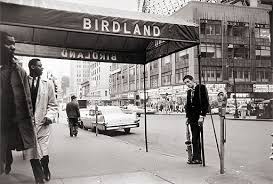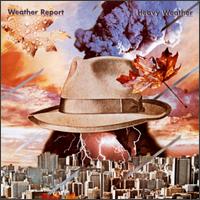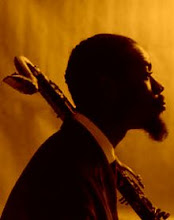Weather Report performing Birdland in 1978, Stadthalle Offenbach.
It's autumn 1944 - the end of World War Two in Europe is just months away and thousands of Allied bombs are falling on Vienna, Austria. At he prestigious Vienna Conservatory, a twelve -year old pianist named Josef Erich Zawinul is among 28 students being evacuated to a large estate in the Czech Sudentenland, where they will continue studies while being forced to endure a regimented life that includes war training under the direction of injured German SS officers. It is here that Zawinul hears jazz for the first time when a fellow student performs an impromptu version of "Honeysuckle Rose".

For a musical impression of this period in Joe's life, listen to this - "Unknown Soldier" - from his autobiographical symphony Stories of the Danube
In the years immediately following the war, Europe is feeling the influence of the occupying Americans and Zawinul's interest in jazz deepens; he becomes a professional musician playing in clubs on American military bases, he becomes a fan of Armed Forces Radio and he becomes a reader of Down Beat magazine where he see an advertisement for the Berklee School of Music. In 1958 Zawinul applies for and wins a scholarship to Berklee and on January 2 1959 Zawinul boards an ocean liner headed for America with $800 (6000 in 2010 $$) in his pocket. 5 days later, the ship arrives in New York City and Zawinul's impromptu tour of the city begins at 1678 Broadway, corner of 52nd Street, known as the "The Jazz Corner of the World" - the location of the world's most famous jazz club, Birdland.

Named for legendary saxophonist Charlie "YardBird" Parker, the venue was celebrating it's 10th anniversary when Zawinul visited for the first time; later, whenever Zawinul and wife of 40 years, Maxine celebrated their wedding anniversary, thoughts inevitably turned to Birdland, which is were they first met.
The Manhattan Transfer performing Birdland in Tokyo, 1986

Fast forward a couple decades and Joe Zawinul's resume is jam packed with important roles with Maynard Ferguson's big band, Cannonball Adderley's quintet and Miles Davis' super-group, where he met saxophonist Wayne Shorter.By end of 1975 the two men are co-leaders of Weather Report, the preeminent jazz band of seventies, in the middle of recording the legendary album Black Market.
For a musical impression of this period in Joe's life, listen to this - "Unknown Soldier" - from his autobiographical symphony Stories of the Danube
In the years immediately following the war, Europe is feeling the influence of the occupying Americans and Zawinul's interest in jazz deepens; he becomes a professional musician playing in clubs on American military bases, he becomes a fan of Armed Forces Radio and he becomes a reader of Down Beat magazine where he see an advertisement for the Berklee School of Music. In 1958 Zawinul applies for and wins a scholarship to Berklee and on January 2 1959 Zawinul boards an ocean liner headed for America with $800 (6000 in 2010 $$) in his pocket. 5 days later, the ship arrives in New York City and Zawinul's impromptu tour of the city begins at 1678 Broadway, corner of 52nd Street, known as the "The Jazz Corner of the World" - the location of the world's most famous jazz club, Birdland.
Named for legendary saxophonist Charlie "YardBird" Parker, the venue was celebrating it's 10th anniversary when Zawinul visited for the first time; later, whenever Zawinul and wife of 40 years, Maxine celebrated their wedding anniversary, thoughts inevitably turned to Birdland, which is were they first met.
The Manhattan Transfer performing Birdland in Tokyo, 1986
Fast forward a couple decades and Joe Zawinul's resume is jam packed with important roles with Maynard Ferguson's big band, Cannonball Adderley's quintet and Miles Davis' super-group, where he met saxophonist Wayne Shorter.By end of 1975 the two men are co-leaders of Weather Report, the preeminent jazz band of seventies, in the middle of recording the legendary album Black Market.
Before the record could be finished, bassist Alphonso Johnson leaves the band and Zawinul hires a 24 year old bass bass player from Ft. Lauderdale Fl. named John "Jaco" Pastorius("Black Market" photo session at left with Pastorius in the middle). Jaco has been writing letters to Zawinul for years, even going as far as calling himself "The World's Greatest Bass Player" upon meeting Zawinul a few years before. Eventually Zawinul & Shorter relent and ask Pastorius to record a couple of tunes for the unfinished album including "Cannonball", a tribute to the recently deceased Adderley (another Florida native). Pastorius then joins the band for their upcoming European tour and Zawinul is so impressed that he says Jaco is Weather Report's "catalyst." He's invited to stay on for work on the recording of the album Heavy Weather and the band's popularity explodes after the world hears Pastorius's bass playing and singing on the LP's first track - Birdland.
Jaco Pastorius, on the road with Weather Report for the first time, Montreux 1976
As Zawinul put it , "I heard him (Pastorius) play 4 bars and I knew history was being made." Indeed, the new man in the bass chair provided the consummate and transformational mix of virtuosity and showmanship that took the band from an jazz fusion experiment into huge commercial and critical success. Not to take anything away from the immensely gifted Alphonso Johnson but, hearing his style then or now makes it virtually impossible to imagine him playing those signature and (as Zawinul correctly said) "historic" licks that make Birdland what it is today - an unqualified classic. Just ask Quincy Jones or the scores of musicians who have performed or recorded it.
Birdland provides a rare snapshot of legendary, game changing musicians at peak performance - as a group Weather Report was never better, the chemistry of Zawinul et al. at the time of it's recording elicited a rare combination of critical and commercial accolades; Heavy Weather is the best selling album in the band's history - one million and counting - and the litany of awards included jazz album of the year- 1977. Birdland became a hit single, unheard of for jazz music then and certainly now. Zawinul & Shorter were also at their creative high-water marks as collaborators and were beginning to explore new avenues as solo artists and would eventually call it quits (Zawinul would try to carry on the spirit in a new band - Weather Update, which only lasted a year). Jaco left the band in 1980, although every bass player that followed seemed to be a respectful emulation of what was now know as the "Jaco" sound. Indeed, many fans felt the band's history ended when Jaco left and it is ironic that he died tragically in 1986, the same year Weather Report ceased to exist.
Birdland provides a rare snapshot of legendary, game changing musicians at peak performance - as a group Weather Report was never better, the chemistry of Zawinul et al. at the time of it's recording elicited a rare combination of critical and commercial accolades; Heavy Weather is the best selling album in the band's history - one million and counting - and the litany of awards included jazz album of the year- 1977. Birdland became a hit single, unheard of for jazz music then and certainly now. Zawinul & Shorter were also at their creative high-water marks as collaborators and were beginning to explore new avenues as solo artists and would eventually call it quits (Zawinul would try to carry on the spirit in a new band - Weather Update, which only lasted a year). Jaco left the band in 1980, although every bass player that followed seemed to be a respectful emulation of what was now know as the "Jaco" sound. Indeed, many fans felt the band's history ended when Jaco left and it is ironic that he died tragically in 1986, the same year Weather Report ceased to exist.


Jaco died on 9/21/87, not in 1986. Google is your friend.
ReplyDeleteAlso, Jaco remained in the band through 1981, when they recorded the 2nd eponymous album which was released the following year.
ReplyDeleteGreat song. I struggled for years to get my family and friends into fusion and then this song came out and instantly everybody got what I had tried to tell them.
ReplyDeleteSad that it pretty marked the end of fusion.
No it did not
DeleteThanks for the insightful story on Birdland. I just loved it.
ReplyDeleteWould you be able to tell me who wrote this article for citing purposes? Thank you!
ReplyDeleteIt's great that you included the Manhattan Transfer in the history of Birdland.
ReplyDeletePlease don't forget the brilliant lyricist, Jon Hendricks. His role was key to the commercial success of this tune!